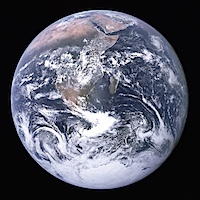 As a meteorologist, the most common question I get asked is, “Are you going to be on TV?” The second most common question I get asked is, “What do you think about global warming/climate change?” This is the question I want to write about here. And to be honest, my thoughts on global warming have gradually done pretty much a 180 over the past 10-15 years.
As a meteorologist, the most common question I get asked is, “Are you going to be on TV?” The second most common question I get asked is, “What do you think about global warming/climate change?” This is the question I want to write about here. And to be honest, my thoughts on global warming have gradually done pretty much a 180 over the past 10-15 years.
Back when I was in high school (1997-2001), I was convinced that anthropogenic (human-caused) global warming was a hoax. I honestly did not find the evidence to be compelling, and I thought natural variability better explained the data. I was so convinced that the case for anthropogenic global warming was a hoax that I wrote an 8-minute mostly-memorized oratory speech for Forensics in 1999, where I laid out what I thought was good evidence that it was a hoax. I even earned a perfect score with my speech at the State Forensics Tournament in Madison that year.
My opinion gradually started to change after I began graduate school for meteorology at Penn State University in 2005. Learning more and more about the fundamentals of atmospheric physics, along with seeing several more years of observations of the earth system come in, began to make me doubt my certainty that global warming was all due to natural variability. Now I am convinced that not only is global warming happening, but I think the evidence indicates that human beings are almost certainly at least partially causing it.
There certainly have been ups and downs in global average temperature throughout history that were entirely natural, but we are most certainly adding an additional component of warming onto the internal natural variability of the climate system. We know from measurements on Mauna Loa in Hawaii that the atmospheric concentration of carbon dioxide (CO2) has been steadily rising since measurements began in 1958 (at about 315 ppm) to today (about 402 ppm, or about a 30% increase in 60 years). The increase in atmospheric CO2 concentrations is due almost solely to human activities, such as the burning of fossil fuels (coal, oil, natural gas), deforestation, and the like.
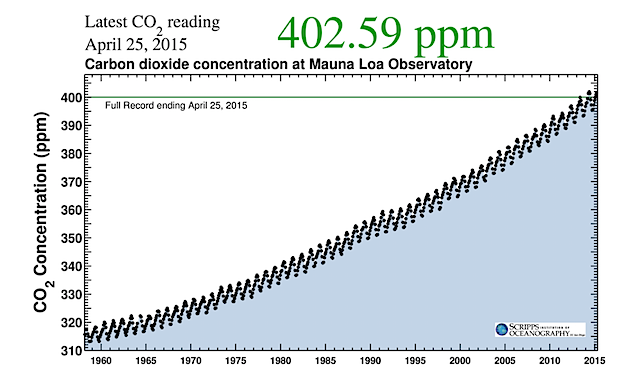
We also know from temperature records that the global average temperature has warmed about 1ºC (or about 2ºF) during the 100-150 years or so over which we’ve taken measurements, with a couple 20-30 year interruptions in that overall warming trend (more on that later).
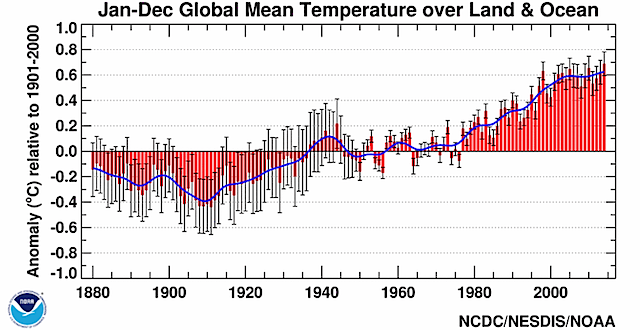
We know from physics that molecules of carbon dioxide and methane both quite effectively absorb and re-emit heat (longwave radiation, technically). The wavelengths of radiation at which they most effectively absorb and re-emit happens to correspond to bands that are known as “atmospheric windows” — wavelength bands to which the atmosphere is generally transparent, and through which the Earth vents much extra heat into space, to keep the Earth system in radiative balance. However, as we add more and more CO2 and methane to the atmosphere, those atmospheric windows become less transparent, and more heat is, in essence, trapped.

All else being equal, this has the effect of warming the Earth’s surface on average over a period of decades. To complicate matters there are several positive and negative feedback processes which amplify and counteract that basic, foundational signal. But, the basic effect is most certainly warming at the surface.
Back to the 20-30 year cooling interruptions we’ve seen periodically. Yes, the Earth cooled from the 1940s to 1970s, but that was from emitting lots of particulate pollution (coal dust, other things) into the atmosphere during a manufacturing boom, which had the effect of reflecting sunlight to space and cooling the planet. Eventually those particulates settled out of the atmosphere, and we started sending less of those pollutants up into the atmosphere (because we got tired of breathing in smog and dirty air), but the CO2 remained — its atmospheric lifetime is not a few weeks or months like many particulates, but rather hundreds of years. And the current hiatus we’ve seen since about 2000 is probably due to several factors, including somewhat less incoming radiation from the sun, a lot of heat getting stored in the deep ocean because of various ocean currents, and various large-scale, natural multi-decadal atmospheric climate oscillations that occur over large sections of the planet and interact with each other. That hiatus is not likely to last more than a few more years, as these natural climate oscillations flip back into their other modes. All those things would likely normally have cooled global average temperatures, were it not for the high and continually-increasing CO2 concentrations in the atmosphere, which are acting to warm temperatures at the surface. In the past 15 years those effects have essentially canceled each other out, but we’re still stuck with being on a plateau at the warmest we’ve been in the past 150 years.
In addition to the surface temperature record and the atmospheric CO2 concentration record, another powerful line of evidence is the decrease in Arctic sea ice extent. Ever since satellite observations of Arctic sea ice extent began in 1979, there have been annual ups and downs, but the overall trend from 1979-present has been a noticeable decrease:
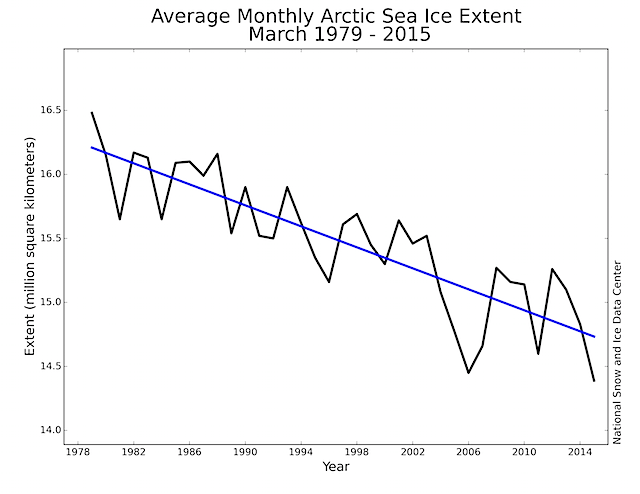
And current observations indicate that sea ice extent is nearly the lowest-ever this year:
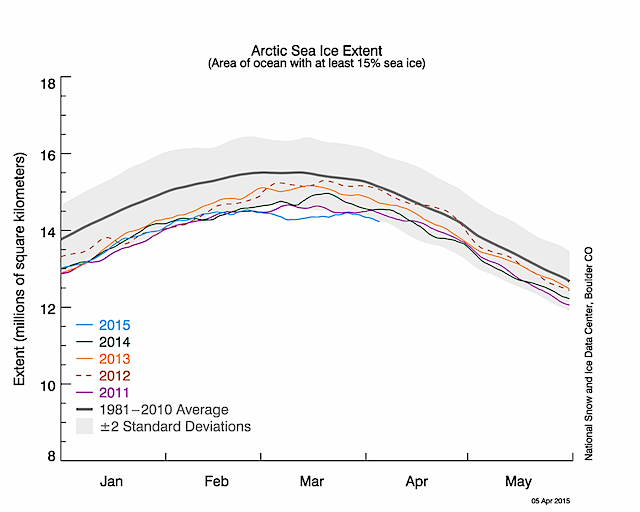
By itself this is not proof that global warming is happening, and while it is true that the Arctic Ocean has been ice-free occasionally in the past, long before the Industrial Revolution, decreasing Arctic sea-ice extent is definitely something we would expect to see in a warming world, along with steadily receding glaciers (which we also see around the world).
In summary, I believe that the evidence is now overwhelming that global warming: a) is really happening, and b) that it is at least partially caused by human activities. What to do in response to this evidence to attempt to mitigate or adapt to future climate change is another topic entirely, and that is where politics enters the discussion. Any mitigation/adaptation strategy has its pros and cons, but what is certain is that in the absence of significant reductions in global carbon emissions soon, the planet will continue to warm. That conclusion is not the result of some vast conspiracy, and it does not depend on the predictions from climate models (many of which have serious flaws) – instead, that is what basic physics tells us. My fellow political conservatives who still think global warming is a hoax would be well served to seriously consider the evidence. Instead of rejecting the scientific evidence because of a distaste for current policy proposals, it would be better to improve or develop better policy proposals in response to the scientific evidence.

5 Responses to So What About Global Warming?